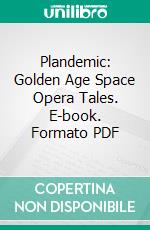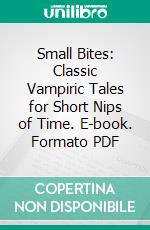Nelson S. Bond: Golden Age Space Opera Tales. E-book. Formato PDF - 9788835875680
di S. H. Marpel
edito da MIDWEST JOURNAL PRESS , 2020
Formato: PDF - Protezione: nessuna
Nelson Slade Bond (November 23, 1908 – November 4, 2006) was an American author who wrote extensively for books, magazines, radio, television and the stage.
The 1998 recipient of the Nebula Author Emeritus award for lifetime achievement, Bond was a pioneer in early science fiction and fantasy. His published fiction is mainly short stories, most of which appeared in pulp magazines in the 1930s and 1940s. Many were published in Blue Book magazine. He is noted for his "Lancelot Biggs" series of stories and for his "Meg the Priestess" tales, which introduced one of the first powerful female characters in science fiction.
He started by writing sports stories but made his first significant sale with "Mr. Mergenthwerker's Lobblies", which was published in Scribner's Magazine in 1937. His first science fiction story was "Down the Dimensions" in the April 1937 issue of Astounding. He only wrote occasional non-fiction once he was established as an author of fiction.
Space Opera is a subgenre of science fiction that emphasizes space warfare, melodramatic adventure, interplanetary battles, chivalric romance, and risk-taking. Set mainly or entirely in outer space, it usually involves conflict between opponents possessing advanced abilities, futuristic weapons, and other sophisticated technology.
The term has no relation to music, as in a traditional opera, but is instead a play on the terms "soap opera", a melodramatic television series, and "horse opera", which was coined during the 1930s to indicate a formulaic Western movie. Space operas emerged in the 1930s and continue to be produced in literature, film, comics, television, and video games.
The Golden Age of Pulp Magazine Fiction derives from pulp magazines (often referred to as "the pulps") as they were inexpensive fiction magazines that were published from 1896 to the late 1950s. The term pulp derives from the cheap wood pulp paper on which the magazines were printed. In contrast, magazines printed on higher-quality paper were called "glossies" or "slicks". (Wikipedia)
The pulps gave rise to the term pulp fiction. Pulps were the successors to the penny dreadfuls, dime novels, and short-fiction magazines of the 19th century. Although many writers wrote for pulps, the magazines were proving grounds for those authors like Robert Heinlein, Louis LaMour, "Max Brand", Ray Bradbury, Philip K. Dick, and many others. The best writers moved onto longer fiction required by paperback publishers. Many of these authors have never been out of print, even long after their passing.
Anthology containing:
Lighter Than You Think
Trouble on Tycho
The Ballad of Blaster Bill
The Castaway
The Ballad of Venus Nell
Beyond Light
Captain Chaos
"Shadrach"
Revolt on Io
The Lorelei Death
Castaways of Eros
Colossus of Chaos
Dictator of Time
Phantom Out of Time
The Ultimate Salient
Scroll Up and Get Your Copy Now
The 1998 recipient of the Nebula Author Emeritus award for lifetime achievement, Bond was a pioneer in early science fiction and fantasy. His published fiction is mainly short stories, most of which appeared in pulp magazines in the 1930s and 1940s. Many were published in Blue Book magazine. He is noted for his "Lancelot Biggs" series of stories and for his "Meg the Priestess" tales, which introduced one of the first powerful female characters in science fiction.
He started by writing sports stories but made his first significant sale with "Mr. Mergenthwerker's Lobblies", which was published in Scribner's Magazine in 1937. His first science fiction story was "Down the Dimensions" in the April 1937 issue of Astounding. He only wrote occasional non-fiction once he was established as an author of fiction.
Space Opera is a subgenre of science fiction that emphasizes space warfare, melodramatic adventure, interplanetary battles, chivalric romance, and risk-taking. Set mainly or entirely in outer space, it usually involves conflict between opponents possessing advanced abilities, futuristic weapons, and other sophisticated technology.
The term has no relation to music, as in a traditional opera, but is instead a play on the terms "soap opera", a melodramatic television series, and "horse opera", which was coined during the 1930s to indicate a formulaic Western movie. Space operas emerged in the 1930s and continue to be produced in literature, film, comics, television, and video games.
The Golden Age of Pulp Magazine Fiction derives from pulp magazines (often referred to as "the pulps") as they were inexpensive fiction magazines that were published from 1896 to the late 1950s. The term pulp derives from the cheap wood pulp paper on which the magazines were printed. In contrast, magazines printed on higher-quality paper were called "glossies" or "slicks". (Wikipedia)
The pulps gave rise to the term pulp fiction. Pulps were the successors to the penny dreadfuls, dime novels, and short-fiction magazines of the 19th century. Although many writers wrote for pulps, the magazines were proving grounds for those authors like Robert Heinlein, Louis LaMour, "Max Brand", Ray Bradbury, Philip K. Dick, and many others. The best writers moved onto longer fiction required by paperback publishers. Many of these authors have never been out of print, even long after their passing.
Anthology containing:
Lighter Than You Think
Trouble on Tycho
The Ballad of Blaster Bill
The Castaway
The Ballad of Venus Nell
Beyond Light
Captain Chaos
"Shadrach"
Revolt on Io
The Lorelei Death
Castaways of Eros
Colossus of Chaos
Dictator of Time
Phantom Out of Time
The Ultimate Salient
Scroll Up and Get Your Copy Now
Ean
9788835875680
Titolo
Nelson S. Bond: Golden Age Space Opera Tales. E-book. Formato PDF
Autore
Editore
Data Pubblicazione
2020
Formato
PDF
Protezione
nessuna
Punti Accumulabili








